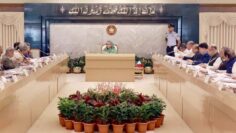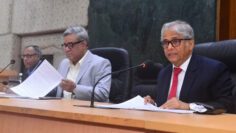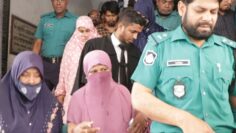Myanmar’s UN envoy fired for opposing coup in his country
PBC News: Myanmar’s UN ambassador strongly opposed the military coup in his country and appealed for the “strongest possible action from the international community” to immediately restore democracy, in a dramatic speech to the U.N. General Assembly Friday that drew loud applause from many diplomats in the 193-nation global body.
Ambassador Kyaw Moe Tun began his statement saying he represented Aung San Suu Kyi’s “civilian government elected by the people” in November, and supported their fight for the end of military rule.
He urged all countries to issue public statements strongly condemning the Feb. 1 coup, and to refuse to recognize the military regime and ask its leaders to respect the free and fair elections in November won by Suu Kyi’s National League for Democracy party. He also urged stronger international measures to stop violence by security forces against peaceful demonstrators.
“It is time for the military to immediately relinquish power and release those detained,” Tun said, agreeing with U.N. Secretary-General Antonio Guterres that military coup “is not acceptable in this modern world and the coup must cease.”
“We will continue to fight for a government which is of the people, by the people, for the people,” he vowed.
Tun’s surprise statement not only drew applause but commendations from speaker after speaker at the assembly meeting including ambassadors representing the European Union, the Organization of Islamic Cooperation and the new U.S. ambassador, Linda Thomas Greenfield. She joined others in describing the speech as “courageous,” “powerful” and “brave.”
In her first appearance at the assembly since presenting her credentials to Guterres in Thursday, Thomas-Greenfield said the United States “stands in solidarity” with the people of Myanmar who are in the streets protesting the coup. And she reiterated President Joe Biden’s warning that “we will show the military that their actions have consequences” and demand to the military “to immediately relinquish power.”
In a tweet later, U.S. Secretary of State Antony Blinken referred to Myanmar by its former name Burma and said “the United States commends the courageous and clear statement” of Ambassador Tun, “and by those in Burma who are making their voices heard. We must all heed their call to restore democracy in Burma.”
The assembly meeting was called to hear a briefing from the U.N. special envoy for Myanmar, Christine Schraner Burgener, who said it is time to “sound the alarm” about the coup and the military pushing democratic processes aside, violating the constitution, reversing reforms instituted by Suu Kyi, and arresting peaceful protesters, civil society representatives and members of the media.
She pointed to restrictions on the internet and communication services and the detention of about 700 people according to the Assistance Association for Political Prisoners in Myanmar, and she called “the use of lethal force and rising deaths unacceptable.”
The huge protests in the country are not about a fight between Suu Kyi’s party and the military, she said, “it is a fight without arms.”
Addressing diplomats in the General Assembly chamber by video link, Schraner Burgener urged “all of you to collectively send a clear signal in support of democracy in Myanmar.”
The military takeover in Myanmar shocked the international community and reversed years of slow progress toward democracy. Suu Kyi’s party would have been installed for a second five-year term that day, but the army blocked Parliament from convening and detained her, President Win Myint and other top members of her government.


















